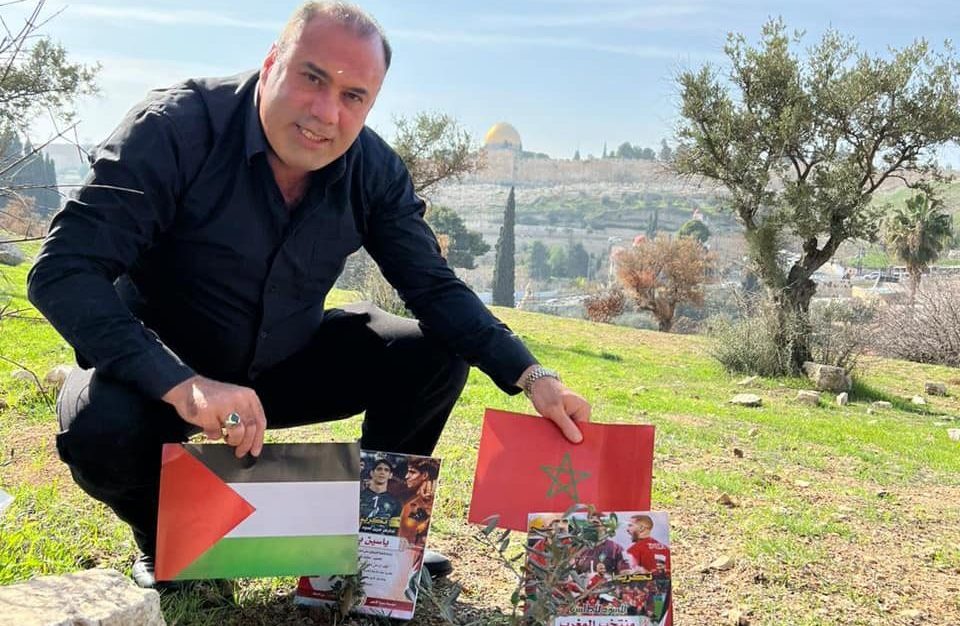Many Palestinians believe the World Cup in Qatar brought back their faith in the Arab world’s support for the cause after the 2020-2021 wave of normalisation.
Palestinians in Jerusalem planted olive trees in celebration of Morocco’s historic World Cup victory on Saturday after reaching the semi-finals.
Led by “The Lady of the Land” organisation in Palestine, the initiative includes the planting of two olive trees, one for the Atlas Lions and its goalie Yassine Bounou who stole many hearts at the tournament.
Morocco had beaten Portugal in a tough match, becoming the first African, Arab and Muslim country to reach the semi-finals in the World Cup’s history.
In a Facebook statement, the organisation said it planted the trees as part of its “loyalty to all Arab accomplishments and contributions that lift the rank of the Arab world”. The Palestinian body noted that it managed to reach Olive Mountain after facing obstacles from Israeli forces.
The trees were eventually planted in a strategic area close to the Mughrabi Quarter, also known as the Moroccans’ neighbourhood.
“The great Moroccan national team has filled us with love and given us more brilliance and faith in the future. This legendary victory of the Atlas Lions has restored our confidence in the possibility of achieving dreams,” Kamal Al-Husseini, the Lady of the Land’s CEO, said.
The olive tree itself is a major symbol of Palestine, with the plants eventually becoming a key symbol of resistance against the ongoing Israeli occupation.
Olive trees are known to be drought-resistant and are able to grow despite poor soil conditions, a characteristic regularly used to describe resistant Palestinians facing more than 70 years of Israeli occupation.
Palestine olive trees grow as old as 4,000 years, making them some of the oldest trees in the world.
However, 80% of Palestinian farmers have lost access to their own lands due to the Israeli occupation. While just a few have some sort of access to their farms, they still cannot freely use them due to restrictions imposed by Israel.
A symbolic win
Morocco’s latest win represented a symbolic moment for the World Cup, especially as the first to ever take place in an Arab and Muslim country. The Moroccan team’s win is seen as a victory for the entirety of the region and the Palestinian cause, which has long been central to the Arab world.
People in Qatar, including Moroccans, waved the Palestinian flag as Morocco’s flag was seen soaring all over Palestine, displaying the spirit of Arab unity. In turn, Palestinians faced violent crackdowns by Israeli forces as crowds in Doha chanted for Palestine.
Commenting on the tournament, Al-Husseini said that the World Cup represents the Arab identity and brought back the Palestinian cause under the spotlight. The global event also exhibited a drastic difference between the stances of the people in comparison to their governments that normalised with Israel.
Morocco joined a shocking wave of normalisation between 2020 and 2021, after Bahrain and the United Arab Emirates signed the controversial Abraham Accords with Israel. The accord, widely condemned by Arab nations, officially normalised ties between the countries and the Zionist state.
Beyond Morocco’s games, the Palestinian flag has been flying all over Qatar since the start of the major sporting event, especially in front of the lens of Israeli journalists.
A total of 66% of Palestinians surveyed by the Palestinian Center for Policy and Survey Research said that the World Cup restored their faith in Arab populations’ stance against normalisation.
The survey includes a 1,200 population from 120 areas in the West Bank and Gaza Strip and was conducted between 7 and 10 December.
Commenting on Qatar’s hosting of the tournament, 68% from Palestinian fans said that Qatar’s global position became of much more importance.







